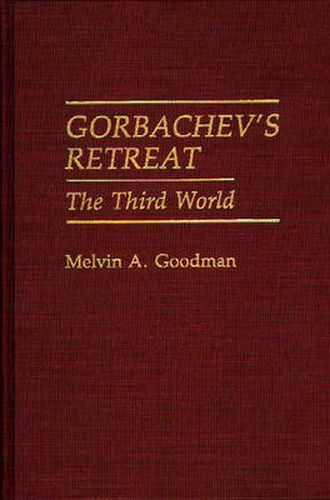Readings Newsletter
Become a Readings Member to make your shopping experience even easier.
Sign in or sign up for free!
You’re not far away from qualifying for FREE standard shipping within Australia
You’ve qualified for FREE standard shipping within Australia
The cart is loading…






In this inquiry into the Soviet retreat from the Third World, Melvin A. Goodman analyzes Gorbachev’s policy from the standpoint of disillusionment with the Third World. He cites, among other reasons for the retreat, the diminished strategic significance of the Third World to current Soviet leadership, the limitations for Soviet power projection in distant areas, and the dilemmas in Moscow’s relations with Third World regimes. Goodman contends that Gorbachev’s foreign policy shift to achieve a more stable international arena and a less militant Soviet stance allowed Moscow to focus on its internal economic problems. This volume provides the first exploration of Afghanistan as a watershed in Soviet thinking on the Third World and discusses the current Soviet emphasis on conflict management and resolution in Third World states - particularly Afghanistan, Angola, Ethiopia, and Nicaragua. Gorbachev’s Retreat explains how co-operation with the United States improves Moscow’s image in the West and tends to stabilize Third World flash points. Data on Soviet military and economic assistance to the Third World as well as Third World responses to the Soviet policy are also presented. The volume examines Soviet retrenchment and retreat in the Third World; analyzes Gorbachev’s decisions relative to Third World relationships; zeroes in on the withdrawal from Afghanistan; explores some of the reasons for Soviet power limitations; and assesses the regional implications of Gorbachev’s New Political Thinking . It then looks at Soviet power projection and crisis management, Soviety military and economic aid, and Soviet retreat in the 1990s. The volume should be particularly useful to undergraduate and graduate courses in foreign policy and international relations as a discussion of the impact of the new Soviet policy in the Third World and the consequences for US Soviet relations.
$9.00 standard shipping within Australia
FREE standard shipping within Australia for orders over $100.00
Express & International shipping calculated at checkout
In this inquiry into the Soviet retreat from the Third World, Melvin A. Goodman analyzes Gorbachev’s policy from the standpoint of disillusionment with the Third World. He cites, among other reasons for the retreat, the diminished strategic significance of the Third World to current Soviet leadership, the limitations for Soviet power projection in distant areas, and the dilemmas in Moscow’s relations with Third World regimes. Goodman contends that Gorbachev’s foreign policy shift to achieve a more stable international arena and a less militant Soviet stance allowed Moscow to focus on its internal economic problems. This volume provides the first exploration of Afghanistan as a watershed in Soviet thinking on the Third World and discusses the current Soviet emphasis on conflict management and resolution in Third World states - particularly Afghanistan, Angola, Ethiopia, and Nicaragua. Gorbachev’s Retreat explains how co-operation with the United States improves Moscow’s image in the West and tends to stabilize Third World flash points. Data on Soviet military and economic assistance to the Third World as well as Third World responses to the Soviet policy are also presented. The volume examines Soviet retrenchment and retreat in the Third World; analyzes Gorbachev’s decisions relative to Third World relationships; zeroes in on the withdrawal from Afghanistan; explores some of the reasons for Soviet power limitations; and assesses the regional implications of Gorbachev’s New Political Thinking . It then looks at Soviet power projection and crisis management, Soviety military and economic aid, and Soviet retreat in the 1990s. The volume should be particularly useful to undergraduate and graduate courses in foreign policy and international relations as a discussion of the impact of the new Soviet policy in the Third World and the consequences for US Soviet relations.